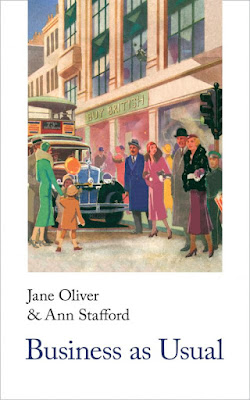 |
| Business As Usual / Jane Oliver & Ann Stafford Handheld Press, 2020, c1933. 242 p. |
Now here's a store novel that is not twee or earnest; it's funny and mostly realistic, with mentions of working conditions of regular women, and the perils that face single women in the 30s.
This is an epistolary novel, a story told in letters by our heroine Hilary Fane to a variety of her friends and family, with cute drawings appended to many. It faintly reminds me of Daddy-Long-Legs in its style, except that there is no creepy love story between schoolgirl and sugar daddy in this one.
Hilary has her BA and is engaged to up-and-coming doctor Basil. They won't be able to marry for a year, so she's decided that rather than moon about at home waiting for him, she's going to see if she can support herself for the year and get a feel for 'real life'. She goes to London, and can't seem to get a position as easily as she thought she would. With her savings diminishing quickly, she considers giving up, but then lucks into a position in the lending library records department at Everyman's (a department store heavily reminiscent of Selfridges).
Despite her being so self-deprecating in her letters, she quickly moves from clerk to sales associate on the floor (as she baldly states, BAs or Titles are the key to the better roles). She's not great at sales due to her lack of math skills, so ends up in the front end of the lending library where she goes gung-ho with reorganizing and streamlining processes, much to the (not unexpected) ire of long-time employees. But Hilary has an in - she's also begun to write notes and memorandum back and forth to Everyman's head manager, who likes her gusto (and most likely her youth and beauty as well). Basil's letters, in comparison, show him off more and more as a pompous social climber, heartless and self-involved.
There is quite a bit of humour in this, as Hilary writes to Basil and her family about her living conditions, work drama, the sudden appearance in the Lending Library of her eccentric rich aunt (causing quite a stir), and so forth. But there is also some quite serious commentary, on the poor scrimping typists she first works with, who are all much older than she is and sharing rooms to get by even so. And with no outlook for anything different. There is a woman of her own age working there, too, who is having a romance with one of the male employees out front; but she gets into trouble and he immediately drops her. Hilary tries to help, appealing to Basil for assistance in finding a nursing home which will remove the trouble (he of course is appalled). Although Hilary herself has nothing to worry about in the future department, she has empathy for those she sees around her, beginning to understand the way other women have to move in the world.
I really like store novels, and also love epistolary novels, and this one was very satisfying in both respects. It's really about a working life, and the letters are varied and amusing, while actually feeling like letters (and notes, and memoranda). I'd definitely recommend this one if you enjoy those things as well, along with a splash of social realism and romanticism - those things sitting beside one another surprisingly well in this novel.
I have a copy of this on my shelf!! You have made me glad of this fact.
ReplyDelete